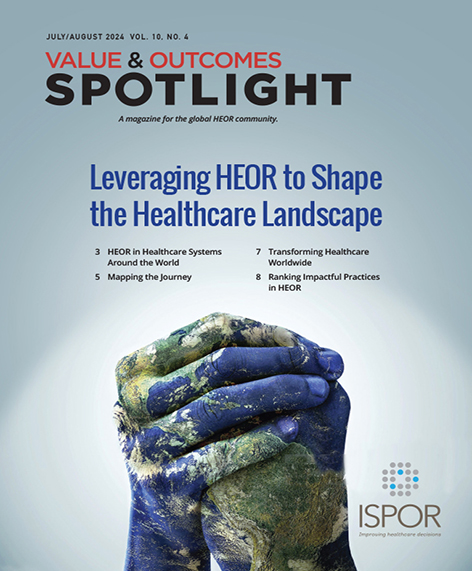HTA Policy Update
Section Editors: Sandra Nestler-Parr, PhD, MPhil, MSc; Ramiro E. Gilardino, MD, MSc
Welcome to the third edition of the HTA Policy Update, which provides a brief update on notable HTA policy developments from around the globe. We welcome suggestions and guest editorials for future issues; please contact the Value & Outcomes Spotlight editorial office with your ideas.

The Health Technology Assessment (HTA) Policy and Methods Review in Australia was concluded in May 2024. The purpose of the review was to reflect evolving HTA methods and assessment needs of novel health technologies and ensure continuous alignment with national policy objectives. The review examined HTA policy and methods with a focus on identifying areas for improvement to facilitate equitable access to new breakthrough medicines as early as possible and to deliver a strong and uninterrupted supply of the medicines Australians use every day.
HTA procedures and timelines in Denmark have changed as of April 2024. Under the new system, the old 16-week evaluation procedure has been replaced with 3 different processes, taking either 14, 16, or 18 weeks depending on the type of HTA application and specific circumstances of the therapy to be assessed. In addition, companies must specify a realistic application date ahead of the submission to facilitate coordination with available HTA review specialists and mutual agreement of an application date. The Danish Medicines Council (DMC) has also introduced a technical validation procedure to assess within 10 working days of submission whether applications meet formal requirements. The changes aim to expedite case processing and synchronize the HTA evaluation schedule with council and committee meeting dates.
In April 2024, FINOSE, the HTA collaboration in the Nordics, expanded further to include Iceland and subsequently renamed to Joint Nordic HTA Bodies (JNHB) in June 2024. The collaborating HTA bodies are the Danish Medicines Council (DMC), the Finnish Medicines Agency (Fimea), Landspitali - The National University Hospital of Iceland, the Norwegian Medical Products Agency (NOMA), and the Dental and Pharmaceutical Benefits Agency (TLV) in Sweden, representing all Nordic countries. The JNHB collaboration aims to support timely and equal access to medicinal products in the Nordic countries, reduce divergence in HTA methodologies and evidence requirements between the Nordic HTA bodies, share resources and knowledge, increase efficiency in generating assessment reports, and reduce the administrative burden for industry. JNHB recently entered into a collaboration with the Nordic Pharmaceutical Forum, thereby further integrating procurement and securing supply and quality of medicines in the Nordics.
After implementation of numerous amendments, the final draft of the Federal Government’s Medical Research Act (MFG) in Germany was adopted by Parliament (Bundestag) in July 2024. The legislation aims to improve the conditions, remove bureaucratic hurdles and accelerate administrative processes for the development, approval, and manufacturing of medicinal products and devices in Germany. The controversial proposal for confidential pricing for new patent-protected drugs has been revised and clarified in the final draft of the bill: only manufacturers that conduct research in Germany will qualify for the option of confidential pricing at a standardized discount of 9% on the agreed price. Before the MFG comes into effect, currently planned for January 2025, it still needs to pass the German Federal Council (Bundesrat).
Italy’s Medicines Agency (AIFA) has formed a new Technical Committee to support the Scientific and Economic Committee for Medicines in developing a process for the review of existing prescription frameworks in view of scientific evidence, medical care criticalities. Additional objectives are the development of alternative tools for governing prescription appropriateness and sharing AIFA’s decision-making pathways with physicians and relevant scientific societies. The Committee is expected to deliver its results in January 2025.
Sweden’s Ministry of Health and Social Affairs has commissioned the Dental and Pharmaceutical Benefits Agency (TLV) to investigate how health economic analyses can support a better understanding of the development of society’s costs for modifiable risk factors for ill-health. The task for TLV is to examine the current public health policy monitoring system and propose enhancements by incorporating health economic principles, with the aim to optimize societal resources and enhance the efficacy of public health initiatives. TLV’s final report is expected by the end of October 2025.
Taiwan has established the Center for Health Policy and Technology Assessment (CHAPTA) to assist in the HTA review of new health technologies. Having commenced its operations in January 2024, CHAPTA provides pharmacoeconomic assessments of new health technologies with the aim of establishing a national health insurance drug inclusion framework that reflects value and cost-effectiveness. Further, it conducts policy assessments and personnel training, and facilitates information and experience exchange with other international HTA organizations.

